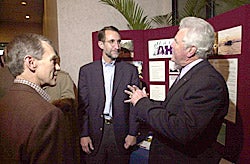ECU, UHS summit aims to improve quality of life in eastern N.C.
Hoping to do more to support economic development in eastern North Carolina, health system and university leaders caucused with regional boosters of every stripe at a “quality-of-life summit” Dec. 4 and 5.
The meeting, consisting of two half-day sessions held at Atlantic Beach, was originally intended to be an educational retreat for the board of University Health Systems of Eastern Carolina. But a growing recognition of the three-way link among the East’s deteriorating economic condition, health care and education provoked a broader, bolder approach. East Carolina University joined as co-sponsor, and the retreat mushroomed into what amounted to a 24- hour brainstorming session.

From left, UHS Chief Executive Dave McRae, Dr. Bill Roper of UNC-Chapel Hill and Bill Shelton, ECU interim chancellor, discuss ways to improve life in eastern North Carolina during a health and economic development summit held Dec. 4-5 in Atlantic Beach.
“It has become clear that we’re not going to improve the health status of the region merely by building a bigger hospital in Greenville,” said Dave McRae, UHS’s chief executive officer. “None of us is going to solve these problems working in isolation. It’s going to take collaboration across the region and the commitment of the people who live and work here.”
The keynote speaker for the event was Dr. William Roper, dean of the School of Public Heath at the University of North Carolina at Chapel Hill. Roper, a physician who has headed the Centers for Disease Control and Prevention and Medicare, discussed three interrelated problems that plague health care in the United States – high cost, poor quality and lack of access. The system is headed toward crisis with each of these challenges, he said.
The problems are largely self-inflicted, though. Roper and others noted, for example, that medical errors and unnecessary medical procedures add considerably to the nation’s health care costs. Moreover, roughly half of all premature deaths in the U.S. population result from unhealthy behaviors such as smoking, poor diet and lack of exercise.
Roper singled out the obesity epidemic as the best recent example of a preventable tragedy. Although reform measures can be taken like working with the food industry to limit sugar and fat content in their products and encouraging schools to promote exercise, ultimately people have to decide they don’t want to be fat.
“We made dramatic progress on smoking in America when it became unfashionable to smoke,” said Roper. “We need to understand better than we do how these kind of mindshifts in the population happen.”
For the remainder of the summit, in general sessions, small group discussions and one-on-one hallway conversations, doctors, educators, health administrators, public health officials, business leaders and politicians shared their perspectives on what it will take to improve the quality of life in the region. There was a thorough airing of the problems but – most seemed to agree – no abundance of answers beyond the need to work together and to favor action over talk.
“I wish I had a magic wand to make it all better, but there’s only one way to make it better and that’s by chipping away at it every day,” said Roper. “You’ve got to be in the community, the schools, the church and the media.”
Lawrence Davenport, a Pitt County farmer and the former chairman of the UHS board of directors, said he has long felt that ECU and University Health Systems should be more involved in “grassroots economic development.” Davenport currently serves as the chairman of the Golden Leaf Foundation, a $2 billion trust fund established with part of the proceeds from the national tobacco settlement. The foundation has a charge to secure the future of rural North Carolina through investments in development activities.
Davenport said the decline of the tobacco economy, the disappearance of textile jobs and the body blows delivered by two hurricanes have produced “a lost generation” in the region.
“Other parts of the state are moving ahead,”